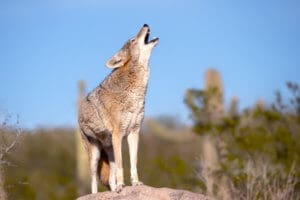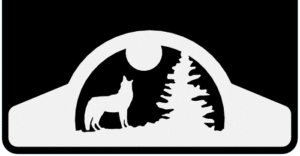We custom design our drill-less mud flaps to any size and then shift them to fit with your aftermarket wheels
How “Wily” Coyotes Got their Reputation
Few childhood cartoon characters are as memorable as “Wile E Coyote,” who desperately attempted to thwart the “Road Runner’s” success. But how accurate are Wile E’s characteristics compared to the real “Wily” coyotes that roam America? And why are they nicknamed as they are? Their history and the story of how coyotes got their reputation is fascinating for animal lovers of all kinds.
 While they may have a loud howl, the coyote is not a large animal. Coyotes are about as big as a mid-size dog, between 20 and 50 pounds–much smaller than wolves. Depending on your location, a coyote in your woods may be gray, white, tan, or brown. Originally, coyotes were only found in prairie and desert regions of central and western North America, but during the westward migration of the 1800s, coyotes were displaced. Today coyote populations are found even in urban populations like Los Angeles.
While they may have a loud howl, the coyote is not a large animal. Coyotes are about as big as a mid-size dog, between 20 and 50 pounds–much smaller than wolves. Depending on your location, a coyote in your woods may be gray, white, tan, or brown. Originally, coyotes were only found in prairie and desert regions of central and western North America, but during the westward migration of the 1800s, coyotes were displaced. Today coyote populations are found even in urban populations like Los Angeles.
How did coyotes get their reputation?
The coyote has been a part of human history for centuries, appearing in early Navajo stories. The Navajo Creation Myths include a Coyote who originated from the primordial medicine bundle when the world was formed. In their Creation Myth, the Coyote causes the flood, originates death, interferes with the placement of stars, and causes general trouble for others. These stories are likely where the coyote first developed the characteristic of being “wily.”
In time, the coyote infiltrated other myths and stories as a general trickster. For example, some North American folk stories include tales of a mischievous and foolish coyote who tries to trick other animals and beings, ultimately causing disaster for himself. He’s seen as greedy, vain, foolish, cunning, and sometimes a bit powerful. Yet all his efforts tend to come back to bite him. These stories pack in the humor, but they intend to convey important messages regarding the importance of kindness, humility, and generosity.
Unfortunately, these stories’ impact on real coyotes is not always positive. While the stories are all purely fictional, many believe coyotes have devious, cunning, and mischievous personalities. This couldn’t be further from the truth.
What are coyotes really like?
First of all, there is little reason for people to fear coyotes. Coyotes do not prey on humans and will generally only attack as a means of defense. The best way to avoid confrontation with coyotes is to avoid aggravating them and limit exposure by not leaving food out where it will attract them.
Coyotes play an important role in keeping our communities clean. During the night, these animals often hunt alone, targeting small prey such as rats, mice, rabbits, and squirrels, as well as insects and fruit. Sometimes they will work together for a larger game, such as hunting down a deer. Yet, keeping the rodent population at bay makes humans less susceptible to diseases these critters spread.
And, of course, coyotes are smart. They communicate with each other by using yips, barks, and howls on top of scents and other visual signals. The coyote howl is perhaps the most iconic image we have of the coyote, and a coyote howling is the artwork that adorns many coyote lovers’ homes and trucks.
Do you love coyotes? If so, we have a custom coyote mud flap perfect for you.
 At DuraFlap, our custom artwork catalog contains over 100 popular designs people love to add to their vehicles, including “Coyote Mud Flap.” We have a design just for you regardless of your hobby or interests. And if you prove us wrong…no problem! We can custom produce stainless steel laser cuts based on a sketch you provide to us.
At DuraFlap, our custom artwork catalog contains over 100 popular designs people love to add to their vehicles, including “Coyote Mud Flap.” We have a design just for you regardless of your hobby or interests. And if you prove us wrong…no problem! We can custom produce stainless steel laser cuts based on a sketch you provide to us.
DuraFlap’s drill-less mudflaps are the highest quality mudflaps you can buy for your truck, and since they use holes that already exist in your vehicle’s body, they are easy to install. Our exclusive “rain grooves” direct rain, snow, and road debris down and away from the vehicle to prevent your truck from being scratched, dented, or just caked with dirt. Call us today at 541-245-9148 to get started!